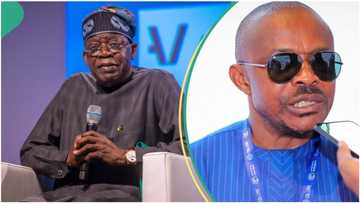One Year in Office: Coalition Lists 5 Things Tinubu Should Do to Address Girls' Education in Nigeria
- The national working group on basic and senior secondary education has asked President Bola Tinubu to prioritise girls' education
- The coalition also encouraged all state governors in Africa's most populous nation to prioritise girls' education in their agendas
- The group said by doing so, Nigeria will be taking significant steps towards a brighter future for all citizens
Legit.ng journalist Ridwan Adeola Yusuf has over 9 years of experience covering education in Nigeria and worldwide.
Suleja, Niger state - The national working group on basic and senior secondary education has called on President Bola Tinubu to convene subnational governments.
At a state of girl education media address at Zuma Rock Resort, Suleja, Niger state, on Wednesday, May 29, the coalition urged the FG to prioritise investing in girls' education.

Read also
Good, bad: List of economic events that shaped President Tinubu’s one-year performance in office
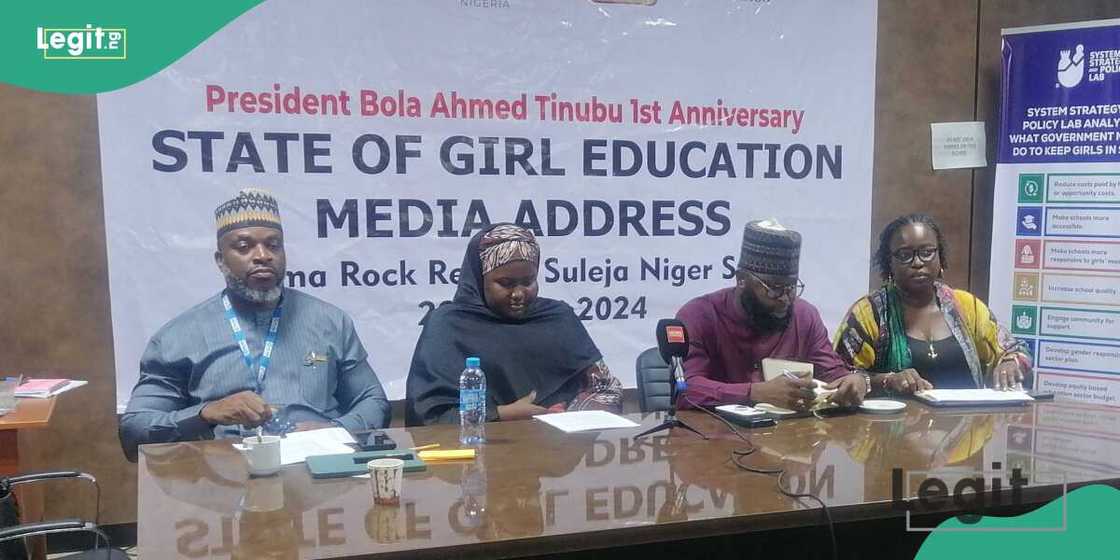
Source: Original
It said "by investing in girls' education this term, Nigeria will be investing in its future stability and prosperity".
The group also charged Tinubu to mobilise, facilitate, and coordinate governors to work in tandem with his commitments to education as captured in the Education for renewed hope: Roadmap for the Nigerian education sector (2024-2027).
On the call to congregate the subnational governments, the coalition said this move, if worked on, would, among others, provide a safe learning environment for all children.
Girls' education: List of what Tinubu should do
- Education strategy alignment:
Key into the education for renewed hope: Roadmap for the Nigerian education sector (2024-2027) by aligning their state education sector plans (SESPs) to important focal areas in the roadmap, such as out-of-school children, basic and senior secondary education, and girl-child education.
2. Fund more, and fund better:
It is imperative that we increase the allocation of resources to the education sector. However, it is not just about funding more but funding better. This means ensuring that funds are efficiently utilised to address pressing educational needs, including teacher training, infrastructure development, and provision of learning materials.
It is, therefore, important to put Nigeria on track in line with Nigeria's commitment to spend 4% of its GDP and 22.5% of its national budget on education by 2025 and maintain this until 2030. State governments, for their concurrency, are key to achieving this. Hence, we ask Mr President to build consensus and show strong leadership to State governors in promoting girls' access, retention, and completion of primary, junior, and senior secondary school.
3. Safe and secure schools for all children:
A safe learning environment is essential for effective education. Schools must be safe spaces for school children and personnel, where they can learn without fear of violence, harassment, or abduction.
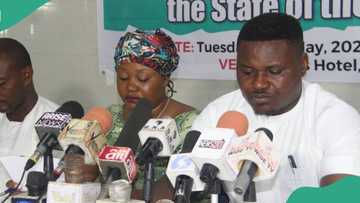
Read also
Rivers: Group hails Governor Fubara on masses-oriented policies, vows to defend him against enemies
The federal government should work swiftly and comprehensively with state governors to implement the National Plan on Financing Safe Schools 2023-2026 and the national policy on safety, security, and violence-free schools. Pay special attention to the unique challenges faced by remote communities, incorporating community-based safety plans, improved security infrastructures, and consistent safety education and drills. Also, strengthen the National Safe Schools Response Coordination Center (NSSRCC) at the headquarters of the Nigerian Security and Civil Defence Corps (NSCDC) which had been very proactive in response to preventing threats of attack on schools.
4. Learning poverty:
Recent data from UNICEF highlights a significant challenge in terms of learning poverty in Nigeria. Learning poverty, as defined by the World Bank, means being unable to read and understand a simple text by age 10. This is a critically high phenomenon in Nigeria, as it is estimated that over 70% of children fall into this category.
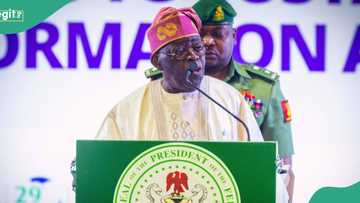
Read also
Tinubu’s one year in office: Full list emerges as APC Germany asks President to focus on 8 areas
This statistic reflects the dire state of Nigeria's education system where even those in schools are not acquiring fundamental skills. The implication is that millions of children, especially girls, are not being equipped with the basic literacy skills necessary for their future.
We recognise the commitment in the Roadmap to gender-responsive learning physical environment, and provision of special skills training for out-of-school girls.
We also applaud the sense in which the roadmap seeks to encourage parents to subscribe to girl-child education and improve enrolment and retention in schools through a cash transfer strategy.
We, however, consider the reliance on conditional cash transfer as a major incentive for getting girls to school comes from a minimalist approach which is incapable of ensuring a substantive number of children, and girls especially, out of school are brought back into learning environments in a poverty-endemic environment. We hereby call on the national assembly to revisit The Constitution (Fifth Alteration) Bill No. 63 (fundamental human rights) which sought to alter the provisions of the constitution to make free, compulsory, and basic education a fundamental right of all citizens under chapter IV of the Constitution. This bill passed by the 9th national assembly was unfortunately not assented to by President Muhammadu Buhari.

Read also
“State's now worth over $1bn agric investments”: Niger Governor Bago hailed over leadership style
5. Out of school children:
In line with Mr President's direction and vision, the federal ministry of education developed a roadmap for the sector with the aim of revamping the education system in Nigeria. Despite all the efforts made by the government, partners could not reduce the number of out-of-school children in Nigeria.
We call on the government of Nigeria to effectively Implement the education roadmap for the Nigerian education sector (2024-2027), especially the pillars 1-3.
As we look ahead, let us remember that the education of our girls is not just a policy issue or just a human right requirement; it is a moral imperative. It is about ensuring that every girl in Nigeria has the opportunity to reach her full potential, contribute to her community, and help build a stronger, more prosperous nation.
Chibok girls: CSO lists things govt must do
Legit.ng earlier reported that a nonprofit organisation (NGO), ImpactHouse Centre for Development Communication, urged President Tinubu to ensure adequate security, quality and inclusive education.
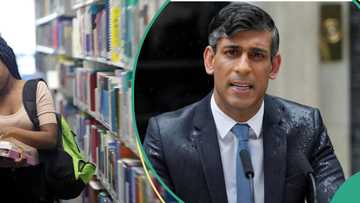
Read also
“Students risk losing their sponsor licence”: UK announces strict rule for Nigerian students, others
On the 10th anniversary of the Chibok kidnapping, ImpactHouse appealed to President Tinubu to tackle insecurity, especially in schools, and create an enabling environment for displaced students to return to school.
Proofreading by James Ojo Adakole, journalist and copy editor at Legit.ng.
PAY ATTENTION: Donate to Legit Charity on Patreon. Your support matters!
Source: Legit.ng


